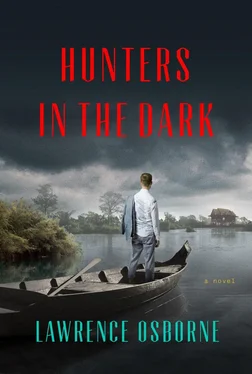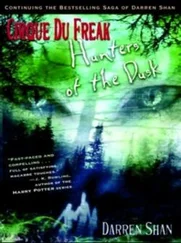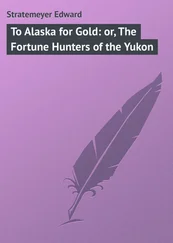“Think about it. You can drink wine.”
“Well,” Robert said irritably, “I don’t really want to drink wine in Cambodia. Who does that?”
“Many, many.”
But in the morning the heavy rain had come at last and the river flickered with more forceful lightning. The drivers sat disconsolately in the Alpha lobby and drank Yaa Dong medicinal liquor and waited for the weather to break. Robert sat with them and bought Ouksa a few coffees and they talked about his girl and the abominable price of car parts. It was amusing enough. The boy seemed to have ironed himself into one long crease for his payday, his hair slicked and the Brut pungent on his cheeks. He had clean hands and girlish nails properly cared for. From time to time he glanced out at the rain and the lax banana fronds flapping in slow motion and his eyes rose in a silent disdain. He was training to be an engineer and he drove a taxi in his spare time.
His spare time, as it turned out, was quite ample. In Battambang the days were long and, as Robert now thought, gently uphill. Ouksa had a contract with a Chinese company that manufactured plumbing parts on the outskirts of town. He took the middle managers around and showed them a good time in the evening. He took them to Kirin, a club where the girls were all dressed like government officials. Did he know it? The Chinese were very into that. They tipped him recklessly and with the proceeds he bought his girl silk dresses and Nokia phones. Such were the visitors from Harbin, flabbergasted in their short-sleeved shirts.
“The barangs, they stay in Angkor place. There were four barangs from Siem Reap yesterday but they left.”
“I think I saw them,” Robert said.
“They did not like. I took them to Kirin and they did not like. I am going to take you to temple Phnom Ba Nan. At the top it is many hippies.”
A great atomic cloud had formed, bright silver at the edges, and as it evolved upward it grew darker. The thunder did not seem related to it. In the street the long puddles brightened for a moment then grew dim, and the electricity which rippled through the air drew the eye to the slow-motion mushroom cloud and its impending crisis.
Ouksa’s face was smooth, open and yet impervious to camaraderie. His fake gold watch had a charm, his eyes were slow and accurate. They didn’t miss a mote of dust.
“I gave you good discount,” he said sheepishly, and as if to reward this acknowledged fact Robert ordered more Nescafé and crêpes.
“If you are happy with service, maybe you will take it day after. Or are you go to Phnom Penh?”
“I don’t know, I might.”
“Thirty dollar take you and come back.”
“Maybe I won’t come back.”
“It OK, stay. I can take you Hotel de Paris!”
“You can take me everywhere, I guess.”
“Au kun, if you want it.”
After they had eaten the crêpes Robert sauntered to the bar and bought some cigarettes and a bottle of Stag for the road. When he returned to the table, Ouksa asked him where his wife was.
“Not got one, as it happens.”
“You such a good-looking man, I don’t believe.”
“No one wants to marry a schoolteacher. There’s no money. You understand that, I’m sure.”
“Sure, no money, girls run away. Same here.”
He sniffed glumly at the window for some reason.
“Where do you live, Robert?”
“In England. You know England?”
Ouksa made a knowing nod. “Of course I know it. Man United.”
“More or less, yeah, that’s about it.”
“So you come here for better living.”
“More or less, you could say.”
“Long way you come. You have girl here?”
“No girl yet.”
Ouksa grew a little bolder.
“But you at White Rose last night!”
“Word gets around, I see.”
“Rainy season — no barangs. So you are news.”
“I see, I’m news, am I?”
“Yes, sir. Everybody see you.”
“Well, I’ll be damned.”
“Next time I take you to Kirin Club.”
“That’s OK, Ouksa. We can leave the girls to the Chinese.”
“Aw, they prefer you, Mr. Robert.”
“But do I prefer them, Mr. Ouksa?”
“You never try Khmer girl? Very sad. We can go to Savuth Club. Girls are dressed to be farmers, all in black. Very kink.”
The rain cleared and they went out to the car and turned on the air-conditioning and waited for a while, then set off through the puddles and mud toward Phnom Ba Nan.
The roads had turned to chaos and they pulled in at the winery after all, a place called Chan Thay Chhoeung. They could wait a while and let it dry out. There was a kind of rose garden with tables for drinkers and a reception with bottles of Chardonnay and Shiraz. They sat in the garden under a shade and played cards with Ouksa’s battered pack. Then, after an hour, the clouds parted and a moist, heavy sunshine came down. The road improved and Ouksa put on his sunglasses and said, “It hot again.”
—
The ruins of Ba Nan lay at the top of a steep hill which had to be climbed on foot. The site was deserted after the rain, and it was probably deserted most of the time anyway. Even the hawkers had scattered. They parked under the monkeypods. Ouksa waited for him at the foot and Robert set out to climb the two or three hundred steps to the top, watching him as he went. A barang guarded by nagas, slow-footed among the hungry. It made him smile. It was torture for nothing, for very little. And sure enough halfway up Robert stopped and rested. He was young but he was out of shape. Soft and sweet, like some kind of fruit that has ripened too early. So Ouksa thought, and after all he was the same age.
Halfway up the hill, the forest was quiet. A monk sat just above him with crazed eyes, motionless under a parasol. At the bottom of the steps the beggar mites had reappeared with their matted hair, but looking up at him they were thinking that he was not really worth the bother of a climb. So he went on alone, suddenly dark at heart, the mosquitoes stinging his neck, and he came above the flat canopy and into a magnified light and a forest horizon that had no gaps, seamless as a flat layer of algae resting upon water.
Ba Nan was strewn all across the hilltop. Its tea-dark blocks scattered into piles which no one had disturbed for a thousand years. He walked through it knowing that he must be alone, since no one had come up with him. The heat made him dizzy. Tall dark pink flowers grew up among the stones. Sprawling prickly-pear trees stood between the prasats and on every one of their paddle-shaped cladodes spells and graffiti had been carved, the letters turned white with hardened sap. Yet there were blue signs which read No Touching and Writing . So the spells were written on the cactus blades.
He took pictures. Trees rose over the ruins, tossing and hissing like the trees at the temple in Pailin. But these were far older. Dark clouds loomed over them, sparkling with menace. The apsaras slowly fading away, the lintels carved and faded. Inside one of the claustrophobic prasats a huge but beautiful carved female foot, severed and orphaned forever. At the edge of the platform, then, he looked down at the silvery haze of the fields and the tall sugar palms and soon he heard voices and looking up he saw two soft-drink hawkers picking their way like herons across the stones toward a barang standing alone at the far edge of the complex and smoking a cigarette. He was aware that the man must have been watching him all along, but there he stood in elegant summer whites, dark blond and incongruous and indifferent all the same. Robert heard the peddlers cry Choum reap and the man took the cigarette out of his mouth and said something to them in Khmer. They turned away and the solitude of the two foreign men was resumed, the man in whites simply returning to his contemplation of something on the distant horizon.
Читать дальше












